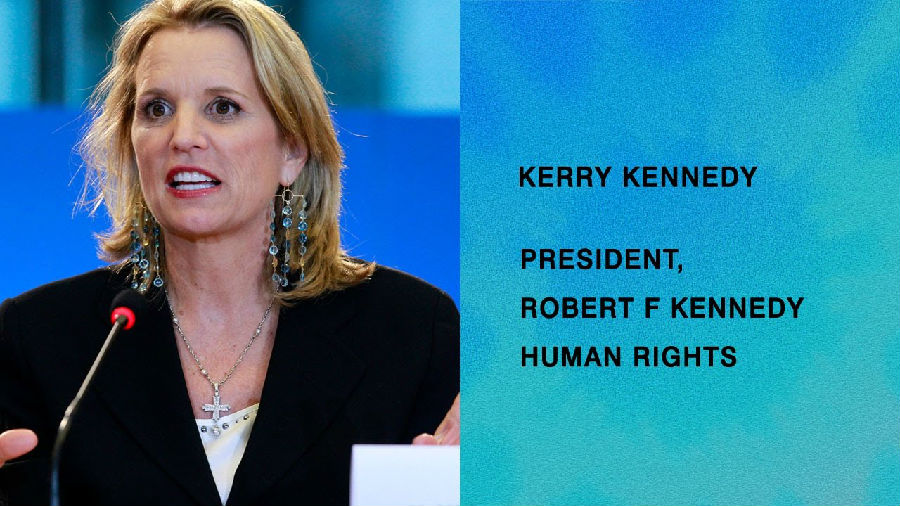IN THE 1950S, he spent much of his time on the Senate Committee on Investigations
上世紀50年代,他曾在參議院調查委員會工作了很長一段時間,
fighting the excesses of its chair, Joe McCarthy, and his chief counsel, Roy Cohn—two figures who echo in the news today.
與委員會主席喬·麥卡錫及其首席法律顧問羅伊·科恩——在今天的新聞里依然能看到兩人的影子——的越權行為作斗爭。
He later caused Cohn's resignation and led to the end of McCarthy’s reign of terror.
后來,科恩辭職,麥卡錫一手遮天時代被終結都有他的功勞。
Asked a decade later by Peter Maas how he could have worked for McCarthy,
十年后,被(記者兼作家)彼得·馬斯問及為何會為麥卡錫工作時,
Kennedy responded, “Well, at the time, I thought there was a serious internal security threat to the United States…
肯尼迪回答說:“這個嘛,那時,我認為我們國家內部出現了嚴重的安全威脅……
(and) Joe McCarthy seemed to be the only one doing anything about it. I was wrong.”
而喬·麥卡錫看似是唯一一個沒有袖手旁觀的人。事實表明我錯了。”
But to leave it at stopping the bullies would not do him justice.
不過,對他的評價僅僅停留在打抱不平一個層面還不夠公道。
On that terrible night when he told a crowd in downtown Indianapolis that Martin Luther King Jr. had been murdered,
在那個可怕的夜晚,在印第安納波利斯市中心向大家公布小馬丁·路德·金被害一事時,
he included in his remarks a quote from Aeschylus:
他引用了(古希臘最偉大的悲劇作家)埃斯庫羅斯的一句話:
“To tame the savageness of man and make gentle the life of the world.”
“馴服內心的狂野,讓世人生活地更加美好。”
Indeed, my father focused much of his life taming the savageness, and he made gentle the life of the world.
的確,我父親生平大部分時間都在致力于實現這一目標。

THERE WAS NO QUALITY my father admired more than courage, save perhaps love.
除了愛之外,我父親最佩服的就是勇氣。
I remember after dinner one night he picked up the battered poetry book that was always somewhere by his side
還記得有一天晚飯后,他拿起一本破舊的詩集,一本他經常會帶在身邊的詩集,
and read aloud Tennyson’s poem “The Charge of the Light Brigade.”
大聲朗誦起了丁尼生的《前進吧,輕騎兵》。
We listened aghast to the story of a group of soldiers
我們驚愕地聽他講著一群士兵的故事。
whose commanding officer orders them to ride into an ambush, knowing they will be slaughtered—yet they still obey the command.
那群士兵的長官明知道他們必然會犧牲,還命令他們沖入埋伏圈,騎兵們竟然也聽從了命令。
My father then explained that he and my mother were going on a trip
接著,父親說他和母親要去旅行,
and challenged us to a contest to see who could best memorize the poem while they were away.
他向我們發起挑戰,看誰在他們不在的時候能把這首詩背得最好。
I did not win that contest—my sister Courtney did—but one stanza still remains with me:
那場比賽我沒有贏——贏的是我妹妹考特尼——但其中有一個詩節至今仍然回蕩在我耳邊:
"Theirs not to reason why, Theirs but to do and die, Into the valley of Death Rode the six hundred"
“他們的責任不是追究原因,而是執行,是赴死,就這樣,六百名騎兵踏入了死亡之谷”
Why would a father ask his ever expanding brood of what became 11 children to memorize a poem about war and slaughter?
一個父親為什么要讓他那隊伍不斷壯大,當時就已經有11人的孩子群背誦一首關于戰爭和殺戮的詩呢?
I think there were three reasons: He wanted to share with us his love of literature.
我認為有三個原因:他想同我們分享他對文學的熱愛。
He wanted us to embrace challenges that appear daunting.
他希望我們接受那些看似令人膽怯的挑戰。
But most of all, he believed it was imperative for us to question authority,
然而,最重要的是,他認為我們必須質疑權威,
and to learn how those who fail that lesson do so at their own peril.
同時學習那些未能吸取這一教訓的人身處險境時是如何質疑權威的。
Now, coming upon 50 years after Robert F. Kennedy's last campaign,
現在正值羅伯特·F.肯尼迪最后一次競選50周年之際,我想跟大家分享這些,
those are among the lessons I think he would have liked to impart to all Americans.
我想,這也是他希望傳授給所有美國人的經驗的一部分吧。
We face daunting challenges both nationally and globally.
當下,無論是就國內還是國外而言,我們都面臨著嚴峻的挑戰。
But we must rise to those tasks armed with courage, faith, love and an abiding commitment to justice,
但是,我們必須帶著勇氣、信心、愛心和對正義的堅定承諾,
yet girded with a healthy sense of skepticism.
以及適當的質疑來直面這些挑戰。
譯文由可可原創,僅供學習交流使用,未經許可請勿轉載。


